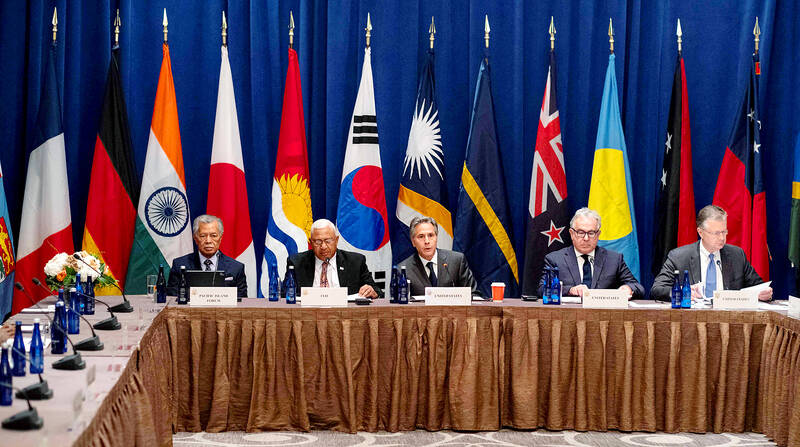China’s ambitions in the Pacific are a concern for some Pacific Island leaders, US National Security Council Indo-Pacific Coordinator Kurt Campbell said on Thursday.
However, a growing US partnership with allies in the region aims to address issues such as climate change, health and technology links, he said.
Campbell spoke after US Secretary of State Antony Blinken hosted a meeting with foreign ministers from the Partners in the Blue Pacific — a group formed in June that includes the US, Australia, Japan, New Zealand and the UK.

Photo: AFP
US officials briefing reporters on the meeting said that Canada and Germany intend to formally join the initiative, which seeks to coordinate assistance to the strategically vital region in the face of competition from China.
“As we’ve seen in some instances, clearly China has ambitions in the Pacific, some of which have caused concern among Pacific Island leaders,” Campbell said.
The group’s agenda would be guided by Pacific Island nations’ needs, he added.
“When we engage with Pacific Islanders, one of the first things that they say is that for us national security really involves our environment and how climate change is an existential issue for them,” Campbell said.
The Partners in the Blue Pacific event, held on the sidelines of the UN General Assembly in New York, comes ahead of a summit US President Joe Biden plans to host with Pacific island leaders on Wednesday and Thursday next week.
The Biden administration has said that the summit reflects its commitment to Pacific Island nations, whose leaders said this month that Washington should accept their priorities, making climate change — not superpower competition — the most urgent security task.
Campbell said that the US, Australia and Japan are involved in a number of efforts to advance undersea cables in the Pacific.
Campbell said two of the initiatives the Quadrilateral Security Dialogue — the US, Japan, India and Australia — want to focus on in the Pacific are maritime domain awareness and increasing island states’ communication links with nations such as Japan, Australia and India.
“That can only be accomplished through the laying of ... undersea cables, and so I think the challenge is before us,” he said. “We think it’s important, and it will require financing and capacity, not just of any one state, but our combined efforts together.”
In a separate meeting, Blinken and his South Korean and Japanese counterparts affirmed a shared commitment to support Pacific Island nations.
A joint statement said that they pledged to look at ways to better help the island nations access climate finance, and reaffirmed support for their efforts to boost maritime security and fisheries protection.

AIR SUPPORT: The Ministry of National Defense thanked the US for the delivery, adding that it was an indicator of the White House’s commitment to the Taiwan Relations Act Deputy Minister of National Defense Po Horng-huei (柏鴻輝) and Representative to the US Alexander Yui on Friday attended a delivery ceremony for the first of Taiwan’s long-awaited 66 F-16C/D Block 70 jets at a Lockheed Martin Corp factory in Greenville, South Carolina. “We are so proud to be the global home of the F-16 and to support Taiwan’s air defense capabilities,” US Representative William Timmons wrote on X, alongside a photograph of Taiwanese and US officials at the event. The F-16C/D Block 70 jets Taiwan ordered have the same capabilities as aircraft that had been upgraded to F-16Vs. The batch of Lockheed Martin

US President Donald Trump yesterday announced sweeping "reciprocal tariffs" on US trading partners, including a 32 percent tax on goods from Taiwan that is set to take effect on Wednesday. At a Rose Garden event, Trump declared a 10 percent baseline tax on imports from all countries, with the White House saying it would take effect on Saturday. Countries with larger trade surpluses with the US would face higher duties beginning on Wednesday, including Taiwan (32 percent), China (34 percent), Japan (24 percent), South Korea (25 percent), Vietnam (46 percent) and Thailand (36 percent). Canada and Mexico, the two largest US trading

GRIDLOCK: The National Fire Agency’s Special Search and Rescue team is on standby to travel to the countries to help out with the rescue effort A powerful earthquake rocked Myanmar and neighboring Thailand yesterday, killing at least three people in Bangkok and burying dozens when a high-rise building under construction collapsed. Footage shared on social media from Myanmar’s second-largest city showed widespread destruction, raising fears that many were trapped under the rubble or killed. The magnitude 7.7 earthquake, with an epicenter near Mandalay in Myanmar, struck at midday and was followed by a strong magnitude 6.4 aftershock. The extent of death, injury and destruction — especially in Myanmar, which is embroiled in a civil war and where information is tightly controlled at the best of times —

China's military today said it began joint army, navy and rocket force exercises around Taiwan to "serve as a stern warning and powerful deterrent against Taiwanese independence," calling President William Lai (賴清德) a "parasite." The exercises come after Lai called Beijing a "foreign hostile force" last month. More than 10 Chinese military ships approached close to Taiwan's 24 nautical mile (44.4km) contiguous zone this morning and Taiwan sent its own warships to respond, two senior Taiwanese officials said. Taiwan has not yet detected any live fire by the Chinese military so far, one of the officials said. The drills took place after US Secretary